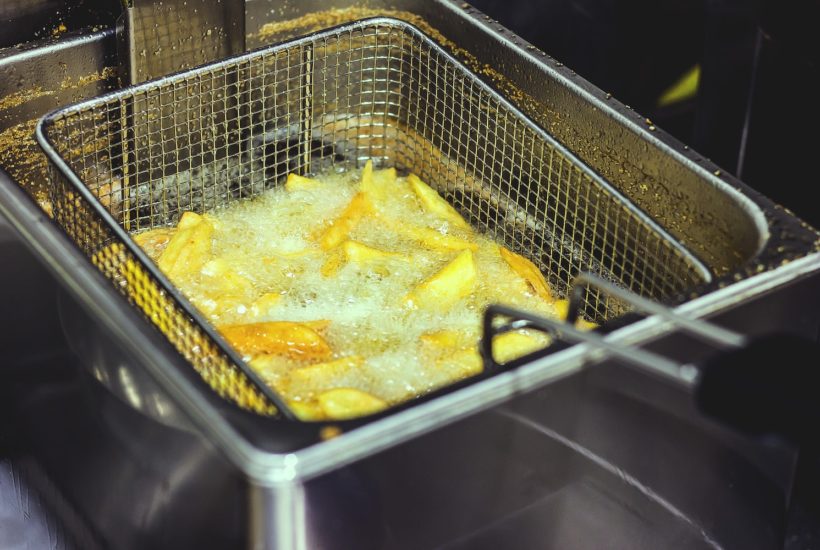Biotech
Used edible oils to be recycled into bioplastics by Sup’Biotech students
One might think that edible oils do not represent any danger of pollution. But this is not the case. The project to recycle these used oils – such as frying oils – in bioplastics developed by engineering students at Sup’Biotech, therefore, seems interesting. Biotechnology engineers came up with a Bioplast Oil project that aims to reach the goal of a zero-waste society.

Each year, significant quantities of used edible oils are discharged into the sewer system. Engineering students at Sup’Biotech decided to tackle the problem. They are developing an ecological and economical process to recycle these oils into bioplastics.
Emptied into the pipes, oils can clog them by freezing. They can also affect the capacities of sewage treatment plants. Mixed with other household waste, they disrupt recycling and are a source of pollution. When dumped into the environment, they have a negative impact on the environment.
The Born2Invest mobile app covers the science of biotechnology and articles on biotech industry leaders, business news, and its surrounding economic and financial milieu.
A solution to the problem of processing edible oils
It is precisely to find a solution to the problem of processing these edible oils that students from Sup’Biotech, a school of biotechnology engineers (Paris), have come up with the Bioplast Oil project. The objective is to produce a bioplastic for industrial use from used edible oils. “In addition to meeting strong demand for alternatives to petrochemical plastics, we are working towards the goal of a zero-waste society as desired by Europe,” explained Pierre-Antoine Bar, the project leader.
“Today’s bioplastics production faces three challenges: competition with food production — because bioplastics are usually made from plant materials such as wheat, corn or potatoes — the use of chemical reagents and an extraction phase that is energy-intensive and consumes a lot of harmful solvents,” said the project leader. “We decided to tackle all of these issues to design a completely green and economical solution.”
The project started in 2017, as part of the Sup’Biotech Innovation Project program, and the small group of six students quickly decided on a bioplastic production process. It consists of degrading used edible oils to transform them into bioplastics using bacteria. At the moment, Pierre-Antoine Bar and his scientific manager, Maxime Laheurte, are taking their project to a final internship with a view to creating a company.
A bioplastic for many applications
“The support of Sup’Biotech has been invaluable to us. In particular, it enabled us to consider all aspects of the development of our project, from highly technical aspects to more economic or societal aspects,” said the Bioplast Oil project leader. “Today, we enjoy the national status of student-entrepreneur, which allows us to continue to carry out our project while being advised and accompanied by teachers and professionals.”
Recently, the duo has been moving up a gear, thanks to the Shaker program offered by the Genopole bio cluster. “It gives us access to laboratories and resources that we didn’t have at school. Our aim is to develop a proof of concept within three months,” continued Pierre-Antoine Bar.
Bioplast Oil project needs the expertise of a polymer chemist
The two student entrepreneurs are just beginning their full-time work within their structure, to evolve at the technical level so that the Bioplast Oil project can gain maturity. Currently, the two entrepreneurs are looking to combine the expertise of a polymer chemist.
“The polymer we’re looking for is very interesting because it promises to be bio-sourced, biodegradable and biocompatible. This will make it interesting for many industrial sectors,” said the project leader. “It could, for example, advantageously replace the plastics used for fishing, which today make up 40% of plastic waste in the seas.”
__
(Featured image by Wine Dharma via Unsplash)
DISCLAIMER: This article was written by a third party contributor and does not reflect the opinion of Born2Invest, its management, staff or its associates. Please review our disclaimer for more information.
This article may include forward-looking statements. These forward-looking statements generally are identified by the words “believe,” “project,” “estimate,” “become,” “plan,” “will,” and similar expressions. These forward-looking statements involve known and unknown risks as well as uncertainties, including those discussed in the following cautionary statements and elsewhere in this article and on this site. Although the Company may believe that its expectations are based on reasonable assumptions, the actual results that the Company may achieve may differ materially from any forward-looking statements, which reflect the opinions of the management of the Company only as of the date hereof. Additionally, please make sure to read these important disclosures.
First published in FUTURA PLANETE, a third-party contributor translated and adapted the article from the original. In case of discrepancy, the original will prevail.
Although we made reasonable efforts to provide accurate translations, some parts may be incorrect. Born2Invest assumes no responsibility for errors, omissions or ambiguities in the translations provided on this website. Any person or entity relying on translated content does so at their own risk. Born2Invest is not responsible for losses caused by such reliance on the accuracy or reliability of translated information. If you wish to report an error or inaccuracy in the translation, we encourage you to contact us.

-

 Cannabis3 days ago
Cannabis3 days agoCannabis Company Adopts Dogecoin for Treasury Innovation
-

 Biotech2 weeks ago
Biotech2 weeks agoPfizer Spain Highlights Innovation and Impact in 2024 Report Amid Key Anniversaries
-

 Markets6 days ago
Markets6 days agoStock Markets Surge Amid Global Uncertainty, But Storm Clouds Loom
-

 Africa3 days ago
Africa3 days agoMorocco Charts a Citizen-Centered Path for Ethical and Inclusive AI

























